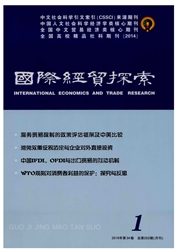

 中文摘要:
中文摘要:
文章通过建立面板数据模型,采用目前研究文献中普遍使用的政治风险度量指数,并纳入影响企业“走出去”的其它关键控制变量后。实证检验结果表明:与现有的理论预期不同,东道国政治风险对我国企业“走出去”并未产生显著负面影响。这一结果可能与我国企业“走出去”过程中对东道国政治风险意识不强、关注不够、认识不足有关。随着中国企业“走出去”步伐加快,以及本轮全球金融危机后国际投资环境中不稳定、不确定性因素增多而导致的可能政治风险加剧,如何有效防范政治风险,已经成为影响中国企业“走出去”能否长远发展的关键因素之一。采取有效措施规避“走出去”过程中所可能面临的政治风险,更好地服务于我国“走出去”战略需要,是理论和实践部门面临的紧要课题。
 英文摘要:
英文摘要:
This paper carries out an econometric analysis of impacts of host countries' political risk on Chinese enterprises' "going global" by establishing the panel data model and using the political risk indicator widely used in academic researches. The empirical result shows that political risk does not have a remarkable impact on Chinese enterprises' "going global", which may be closely related to our enterprises' weak consciousness of host countries' political risk. With the accelerated pace of Chinese enterprises' "going global", and the rising possibility of intensified political risk after the global financial crisis, how to avoid political risk has become one of the key factors of determining the long-term growth capability of Chinese enterprises' "going global", and this is an imperative task faced by both the theoretical and practical fields.
 同期刊论文项目
同期刊论文项目
 同项目期刊论文
同项目期刊论文
 期刊信息
期刊信息
